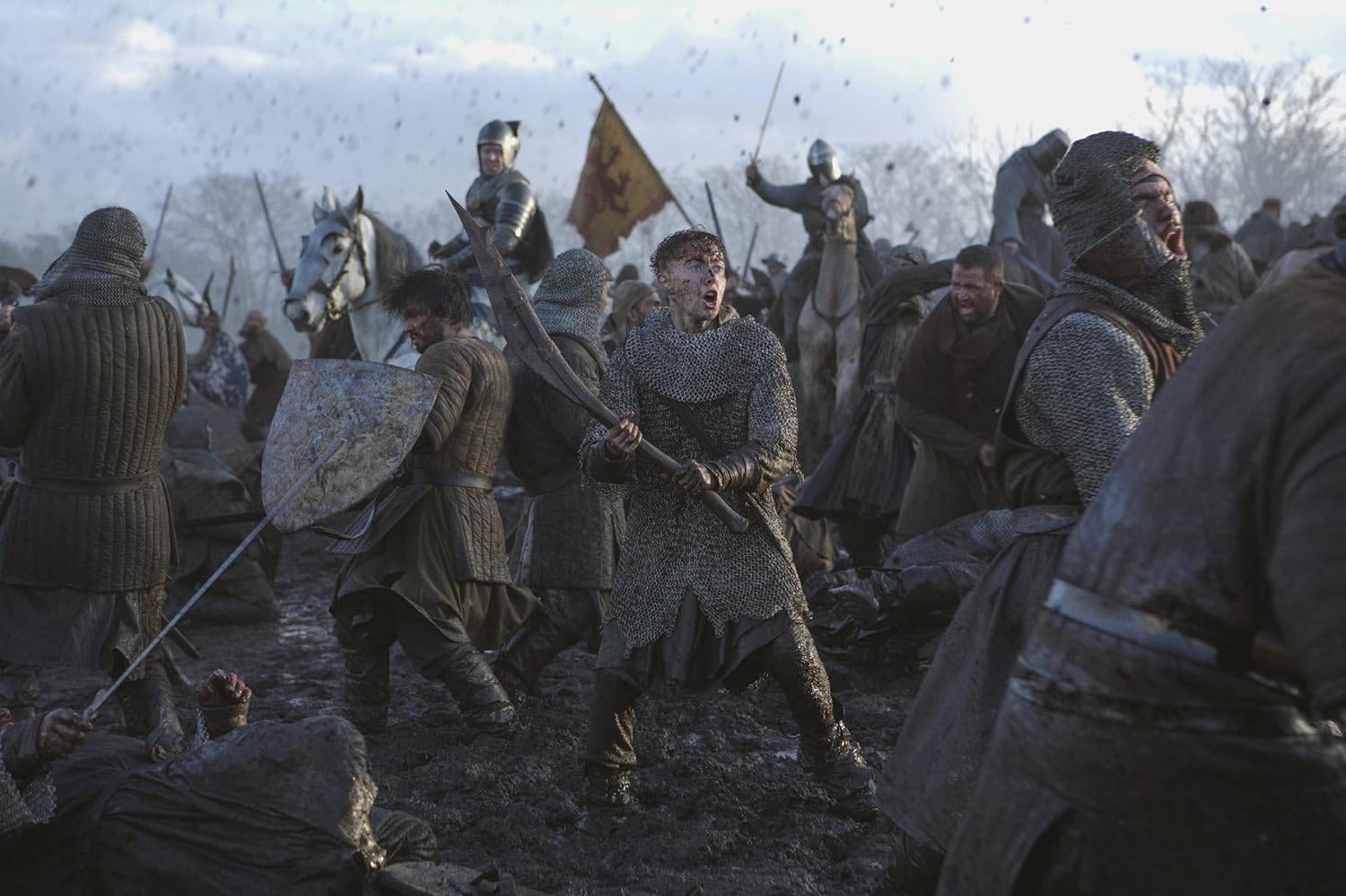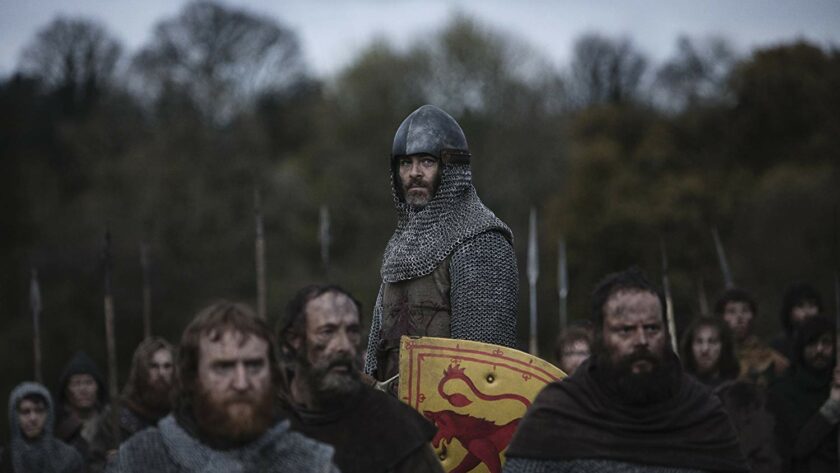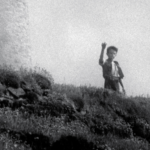Milo Garner dives into the medieval in cinema and Outlaw King’s position in its genre.
What does the medieval look like on film? While this question suggests a great variety of responses, a cursory glance at mainstream medieval cinema defies any such conclusion. The main mode, one adopted by the likes of Ridley Scott’s Kingdom of Heaven and Robin Hood, or Peter Flinth’s Arn – The Knight Templar, is that of almost docu-fiction. Considerable efforts are put into what Robert Rosenstone calls ‘reality effects’, elements of production design that replicate what we know of the past; an attempt to resurrect what has long passed. As according to this philosophy, the filmmaking itself is rarely daring, always preferring a sense of the real. ‘Sense’ being the operative word here – as much as these films seek to replicate the past visually, they often forgo such shackles in their storytelling. Kingdom of Heaven’s Balian is presented as the perfect knight, other than that he’s a philanderer (permissive now, but a mortal sin then); Robin Hood’s French invaders land on the beaches like the soldiers of D-Day; the eponymous Arn appears as the rare Christian knight utterly bereft of prejudice against his Muslim foemen. The result is a bizarre mismatch of visual acuity and narrative anachronism, the supposed conclusion being that this ‘sense’ of the medieval is of far more importance than an embodiment of the time, its norms, its vagaries.
This anachronism need not seem so contrary to the otherwise clear efforts for ‘accuracy’ (a claim that has been attached to all three of the above films by their publicists). To consider another vision of the medieval, Ingmar Bergman’s The Seventh Seal seems a useful analogue. This is a film almost defined by its anachronism – in terms of content, it features a Crusade to the Holy Land, Flagellants, the Black Death, and the persecution of witches as contemporaneous events, despite these phenomena being separated by centuries. Even more troubling might be its philosophical core, which delves to the recesses of nihilism – a 20th century philosophy with no grounding in the god-fearing past. Yet these contradictions of historical record do not render The Seventh Seal a poorer representation of the past than the films abovementioned, but rather combine into a far more effective communication of that period and its anxieties. Through contemporary atheistic philosophizing, Bergman presents a world defined by fear and suffering, one in which the plague stalked and superstition reigned. Antonius Block almost serves as a modern man wandering through a tableau of the Middle Ages, experiencing an expressionistic collage of their struggles through a lens the audience may be more familiar with. Instead of sanitizing the past, Bergman exploits its thematic potential – the result is a story that both informs the past and present in equal measure.

But even this might seem dissatisfactory, as to use the medieval experience to contextualize the modern experience one must undoubtedly corrupt its character in a direct sense, as Bergman has clearly done. František Vláčil presents a further alternative, his Marketa Lazarová delivering a sense of the medieval far more directly. Instead of considering his subjects in a way that might relate them to an audience, Vláčil instead engages with an expressive, even avant-garde manner of filmmaking. His medieval Bohemia is non-specific in date, a vagueness permeating its whole; Vláčil sees the medieval as strange and distant, fearsome and chaotic. He envisions the encroachment of Christianity into polytheist lands, the story (adapted from Vladislav Vančura’s novel of the same name) embracing a grim brutality totally removed from even Bergman’s bleak imagination. Understanding the medieval cannot rely on the simple recreation of past events, supposes Vláčil, but must instead somehow represent something of the medieval mindset, replicate how these ancient people might perceive their own realities. A question of texture over content.
Aleksei German’s Hard to be a God seems to be an ultimate answer to this question. While technically a sci-fi picture set on a distant planet, one far less advanced than our own, the film is essentially set in an equivalent of the Middle Ages. German’s filmmaking almost entirely disposes with narrative, instead focusing on a feeling of the medieval; despite its monochromatic arthouse veneer, it feels as though it should be seen in 3D on the biggest screen possible. Every frame drips with unsettling detail, with blood and unnamed fluids, with an almost visual stench. Filth and dirt seem to envelop everything, violence and misery never far from centre-frame. In one sense Robin Hood is by far the better representation of the past – its dates are correct, its characters are largely real, it is set on Earth. But while entirely fictional in detail and content, Hard to be a God nonetheless suggests a physical texture that Scott’s film doesn’t even attempt to convey.

Outlaw King’s position in this environment isn’t entirely straightforward, but for the most part it sits squarely within the first paragraph. Its set design and period details are well realized, and while its events and characters may be morphed, they are also a recognizable reflection of reality. Its hero, Chris Pine’s Robert the Bruce, becomes much like Orlando Bloom’s Balian in Kingdom of Heaven – a gormless and hopelessly bland embodiment of the hero template, a man who we must support for his doing the right thing, and nothing more. The brutality of the Middle Ages is not shrugged off, but it is also held in visible contempt. Robert the Bruce is better than this, and he fights for this betterment. His mission to “free” Scotland from the English is never granted much context (for all its bullshit – historical and otherwise – Mel Gibson’s Braveheart at least established proper character motivations), instead leaving the viewer to simply suppose he is doing the right thing. The film leaves little room for anything else. This progression is complicated by the film’s own adherence to certain historical events, however. In his largely passive drift through the Scottish wastes, one of Robert’s sole direct actions is the stark murder of a rival claimant in a church (which carries poor connotations now, but then would be a whole other bag of beans). This action the creates a new contradiction – the brutalism of the medieval mindset meeting the romanticized hero narrative of David Mackenzie’s film.
Had Mackenzie considered this action critically it might be more permissible – perhaps Robert had no other option, or perhaps more intriguingly, his ambition for the crown outweighed the clear immorality presented before him. Or both. But instead of a more rigorous examination of the past as per Bergman, or a more expressive (and as such, detached) observation of distant savagery, Mackenzie instead decides to offer a scene of a repentant Robert and then resume the narrative of a romantic king, one who refuses to sleep with his arranged wife after marriage (an unsubstantiated anachronism), and one who will almost botch his bid for the crown in a seemingly idiotic appeal to chivalry, falling foul of a night attack by the English. This second event is particularly interesting as it is, at least in concept, accurate to history. But without prior knowledge of exactly how a medieval king might perceive the world, it seems both foolish and contradictory to his earlier behaviour; any potential for intrigue or interest in Mackenzie’s narrative is lost to the strange marriage of modern morality and historical (mis)detail that so consumed Kingdom of Heaven and its ilk.

Even beyond its conceptual strangeness, Outlaw King fails in its filmic construction. Despite being twenty minutes shorter than its Toronto cut (and a good two hours from the original assembly), it is a film beset by a constant stream of redundant or featureless scenes. It has a romantic subplot which falls out of the narrative (only to return for a saccharine beach-meet finale), a whole slew of wandering-through-Scotland shots, and a distinct lack of substantial character motivations. A few are granted surface objectives, such as Douglas the Black’s mission to reclaim his family lands, but these are so thinly detailed that they are difficult to fully invest in. This isn’t to mention the inter-character relationships, whereby only two distinct relationships can be considered in any way developed. First, Robert and Elizabeth’s, and then King Edward and his son. In fact, the dynamic between the English royals, however simple, might be the only engaging element among the film’s long slew of faces. That, along with the film’s best image – a shot of the young Edward mid-battle cry, a dead swan held by the neck in each hand. Perhaps one of the few elements that felt entirely medieval in a textural sense, reserved to demonize a villain. And I suppose this is where Outlaw King stumbles most as a medieval film – instead of presenting a king that is part of a medieval world, it presents one who seems at odds with it.
To present Outlaw King as wholly negative would, however, be disingenuous. Beyond its impressive production values, the film very much embraces a sense of spectacle that is often reserved for the medieval genre. Its first shot is very much an example of this, a swirling and intensely choreographed long-take that encompasses Robert pledging fealty to Edward, duelling his son, and then witnessing the firing of a trebuchet at a distant castle. The shot functions as a sort of microcosm of the larger film, and effectively lays out Mackenzie’s ideas with an elegance that is never resumed in the two hours or so that remain. Also well realized is the final battle, a grisly and blood-soaked engagement that manages to coax a stirring climax from a film otherwise so desperately limp. Like that first shot, it’ll probably get better play on YouTube than Netflix, but perhaps that’s for the best.
Outlaw King is currently available to stream on Netflix. It is also released limitedly in UK cinemas. Check out its trailer below:




